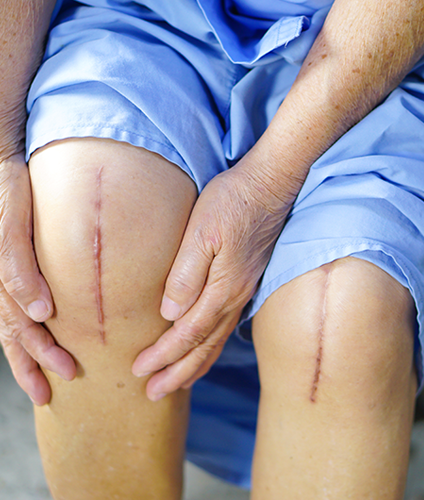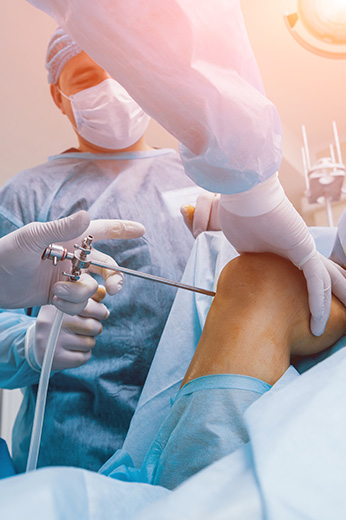

Knee replacement, also known as knee arthroplasty is a surgical procedure in which the damaged bone and cartilage of the knee is replaced with an artificial one. The prosthesis is the artificial body parts that are surgically implanted in place of an original body organ. In the case of the knee, the knee transplant surgery uses a prosthesis made up of metal or plastic to replace the cartilage and bones of the knee. The knees are very complex joints that connect the bones of the legs. Medical conditions like arthritis, any degenerative joint disease, or injury can cause irreversible damage to this joint and as a result, the bones and cartilage of the knee will severely wear down. If the traditional treatment approaches like medication, therapy, etc. do not provide relief to the patient, then total knee replacement surgery is the only reliable option.
With an increase in obesity rate, the cases of knee damage and knee disease are increasing at a fast rate in the entire world. The treatment for these knee problems is widely available in developed and high-income nations, but many low-income nations are unable to receive treatment for knee problems. This is due to inadequate resources that can offer medical services to the patients. For example, in many African countries, there are no optimum medical facilities and resources. In addition to this, the treatment price is also very high. This makes a lot of people travel to different countries for total knee replacement surgery in India.
Every year, a lot of people from different countries visit India for joint replacement surgeries. In India, about 70,000 to 80,000 knee transplant surgeries take place every year. The number of surgeries performed increases every year as more people are becoming aware of the fact that knee problems like arthritis can be resolved by total knee replacement surgery in India. Since the last few years, many people from African countries like Ethiopia, Congo, Ghana, and Uganda have been traveling to India for full knee replacement surgery. This is because joint replacement surgeries in India are performed by experienced knee replacement surgeons, are highly successful and the cost of the surgery is highly profitable and affordable.
Patients need total knee replacement surgery in India if they have severe pain, stiffness, and discomfort in the knees which makes their knees lose their function, and as a result, a person suffers from an inability to do daily life activities. A normal and healthy knee will have hard cartilage which provides cushioning to the joint and hence the bones can move easily. But when a person develops knee disease, it affects the cartilage and as a result, the cartilage becomes thin. At a certain point, the cartilage wears down causing the bones to rub against each other which causes friction. This is the reason why people feel sharp pain when they have knee problems.
There can be any reason as to why this knee cartilage wears down. The most common cause is the inflammatory diseases of the joints. When someone has an inflammatory joint disease such as arthritis, rheumatoid arthritis, or osteoarthritis, it directly affects the knee’s cartilage causing swelling and pain. And stiffness. As the cartilage degenerates, the person suffers from intense sharp pain and extreme discomfort. There are other less invasive treatment and management options available but if the condition gets worse, then the complete knee replacement is the only correct and beneficial treatment option for the damaged knee cartilage.
There are several types of total knee replacement surgery in India depending on what part of the knee is replaced, how many knees are replaced, and many other factors. However, majorly there are two types of knee replacement surgeries which are mentioned below:

As the name suggests, total knee replacement surgery in India is a surgical procedure that involves the replacement of the entire joint of the knee, meaning it involves the replacement of both sides of the joint of the knee. It is a process where the damaged cartilage and bone are removed and replaced by prosthetic ones made up of plastic and metal. By this method, we can restore the function and alignment of the knee. It is also known as total knee arthroplasty.
Partial knee replacement surgery is a procedure that involves the replacement of the knee partially, meaning that either the lateral side or the medial side of the knee is replaced with the prosthetic joint. Partial replacement involves fewer soft tissues and bones as compared to total replacement.
Besides total and partial knee replacement surgery, the other most common knee replacement procedure is bilateral knee replacement which simply means that both of the knees are replaced during a single operation. This is done when the patient has both of the knees affected and damaged.
Sometimes there is a need for corrective surgery due to the previous failed replacement surgery or due to injury that has caused to the knee after the surgery due to an accident. This is known as a revision knee replacement procedure in which the existing prosthesis is removed and replaced with a completely new one.
Prior to the knee replacement operation, your surgeon will want to make sure that you are healthy enough to receive this surgery. To evaluate your candidature for total knee repalcement surgery in India, your surgeon will conduct your physical exam, blood tests, ECG, dental exam, and some imaging tests like x-ray, MRI scan, CT scan, etc. Once everything is clear, the date and time of surgery will be decided.
On the day of the surgery, the operation will be started after giving the patient general anesthesia so that he/she remains unconscious and does not feel any pain during the surgery. Sometimes instead of general anesthesia, a regional anesthesia is given to the patient which will only numb the body below the waist.
Once the anesthesia starts its effects, the surgery will be initiated. First, an intravenous line will be applied to the patient’s arm to give medicines and fluids and a urinary catheter will be placed to drain out the urinary bladder. Also, your heart rate, oxygen, and blood pressure will be continuously monitored during the surgery.
The surgeon will start by making an incision in the knee area, removing the damaged joint parts of the knee, and replacing them with prosthetic ones made up of either metal or plastic. The incision will be then closed with stitches and surgical staples. A bandage and drain will be applied at the surgical site to remove any fluid building up.
The knee replacement operation is an orthopedic surgery which is usually performed by an open surgery method. However, there are minimally invasive methods available in India to perform this surgery which is known as minimally invasive knee arthroplasty. This is a new approach where smaller incisions are made as compared to open surgery. Nowadays a new robot-assisted technique of knee replacement has become very famous in India which is gaining attention of foreign patients due to its high success rate. Robotic techniques are a game changer for joint replacement procedures because they provide multiple advantages such as high efficiency, accuracy, and precision. With robot-assisted surgery, a patient’s recovery time gradually reduces up to 50% as it does not make a larger incision and does not damage the surrounding tissues and bones.
Many robots are being used for joint replacement operations in India. However, two of the most famous among them are Cuvis and Stryker Mako. The Cuvis joint robotic system is a most modern cutting-edge technology that supports the surgeon in providing personalized, precise, and preplanned surgery. It uses a CT scan to show the 3D image of the patient’s knees which helps the surgeon to preplan the surgery. In addition to that, it also helps to preserve the surrounding soft tissues and bones involving only the required area around the knee. Another robot system is Stryker Mako. The Stryker Mako robot system helps the surgeon in planning the customised surgery as it takes the images of a knee from different angles and merges them to create a 3D image of the patient’s knee which guides the surgeon about knowing the anatomy of the patient’s knee. Some of the other robotic systems used for total knee replacement surgery in India are the Rosa® Knee System by Zimmer, the Navio Surgical System by Smith & Nephew, VELYS™ Robotic Assisted Solution by DePuy, and many more.
CureIndia is a platform that bridges the gap between medical tourists seeking treatments in India. We help you choose the right healthcare provider for your medical condition. The surgeons in our associated knee replacement hospitals are highly trained from international institutions and are the most active members of many international medical councils and associations. Let's hear from some of the most reputed surgeons for total knee replacement surgery in India:





Many patients from African countries like Sudan, Nigeria, and Kenya visit here for total knee replacement surgery in India. The cost for total knee replacement surgery in India is less than the total cost of the same in other countries, which makes global patients travel to India for the surgery. Indian hospitals have modern medical pieces of equipment and provide premium medical services. Surgeons in Indian hospitals have many years of deep knowledge and experience in their field. India provides various procedures like Minimal Invasive Knee Surgery, High Flex Knee Replacement, Attune Rotating Platform Knee Replacement, Gender Specific Knee Replacement, and Computer-assisted knee replacement surgery for patients with knee issues. The cost of knee replacement surgery in India is mentioned below:
| Treatment | Cost in India | Stay in India |
|---|---|---|
| Unilateral Knee Replacement Surgery in India | $3,500 | 5 Days |
| Bilateral Knee Replacement Surgery in India | $6,500 | 7-8 Days |
| Unilateral Robotic MAKO Knee Replacement Surgery in India | $5,000 | 5 Days |
| Bilateral Robotic MAKO Knee Replacement Surgery in India | $10,000 | 7-8 days |
| Unilateral Robotic CUVIS Knee Replacement Surgery in India | $4,500 | 5 Days |
| Bilateral Robotic CUVIS Knee Replacement Surgery in India | $9,000 | 7-8 Days |
Robotic knee replacement surgery is the latest medical advancement in the field of orthopaedic surgeries. The procedure involves replacing the damaged knee joint with an artificial one by the assistance of a robot. It combines robotic technology with traditional surgery technique for better precision, accuracy, and results of the surgery.

In a robotic-assisted hip replacement, a robotic arm is used to help the surgeon plan and perform the surgery with high accuracy. The surgeon is still in control, but the robotic arm provides guidance and real-time data during the procedure. This makes the implant placement precise and reduces the recovery time after the total knee replacement surgery in India.
Robotic knee replacement surgery is an advanced knee replacement surgery that is very beneficial for patients. The benefits of robotic knee replacement surgery are:

The Stryker MAKO is a widely-used robotic system in India for knee replacements. It uses preoperative CT scans with a robotic arm to plan and execute the surgery with high precision. With MAKO, you get a more predictable knee replacement surgery with precise implant placement and accuracy. This robotic system provides real-time data and feedback to the surgeons to improve the surgery results and recovery time.

CUVIS is an advanced robotic-assisted surgery system developed by Meril Life Sciences. It is the first Indian fully automated robotic knee replacement system. It provides a surgeon real-time 3D visualisation for pre-planning the surgery based on the patient's anatomy and then precise cutting for the best surgery results. The system uses advanced motion-tracking technology to increase accuracy and complete the surgery with minimal complications.
After the total knee transplant surgery in India is completed, the patient is taken to the recovery room and kept under observation until the patient wakes up (when the effect of anesthesia wears off). Within about 12 to 24 hours, a physical therapist will help the patient get up from the bed and walk a few steps slowly with the help of a walker or any other walking aid. This is important to maintain blood circulation because if not done so, it can cause swelling in the ankles. The patient may need to spend about 1 to 3 days at the hospital depending on the patient’s overall health and condition.
The patient is most likely to feel pain and discomfort initially after the operation. However, it can be managed by consuming the medication that the surgeon will prescribe. Before discharging the patient from the hospital, the surgeon will give some guidelines to follow at home. These guidelines can include applying ice around the knees a few times a day, keeping the knees above the heart level, keeping the surgical wound clean, and doing the recommended exercises regularly to strengthen the knee muscles and prevent stiffness around the knees. If needed, a physical therapist will be provided to the patient who will visit the patient at home to help do some mild exercises. The complete recovery can take a few weeks to months, however, most of the patients can resume their regular life activities within 3 to 6 weeks.
The success rate of total knee replacement surgery in India is very high. Out of every 10, 9 people experience faster recovery and pain relief after the surgery. The report suggests that there is a 95% patient satisfaction with the knee replacement surgery in India. In terms of longevity, about 90% of knee prosthesis last more than 10 years and about 80% of prosthesis remain in a good condition even after 20 years.
The demand for total knee replacement surgery is increasing every year due to increased number of knee problems. This is because many people are living poor lifestyles and many people are suffering from obesity due to unhealthy and sedentary lifestyles. Obesity directly affects the knees and causes pressure on the joints due to which friction is caused in the joints. This causes joint pain which can get worse with time. When the normal treatments and management approaches fail to provide relief from the joint pain, knee replacement surgery is the best option. Nowadays many people are traveling to other countries seeking affordable and high-quality treatments. There is no better country than India for profitable and premium quality treatments. A lot of people from across the world are choosing India due to highest success rate of the treatments and the highly profitable cost of the treatments.


Globally Trusted Brands
Inquire Now
Knee, Hip and Shoulder Replacements
Share Your Reports
Computer Navigated and Keyhole Knee Surgeries
Recover Fast